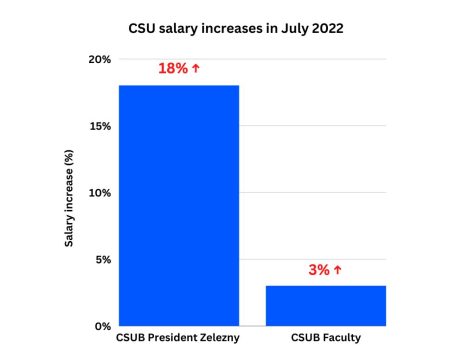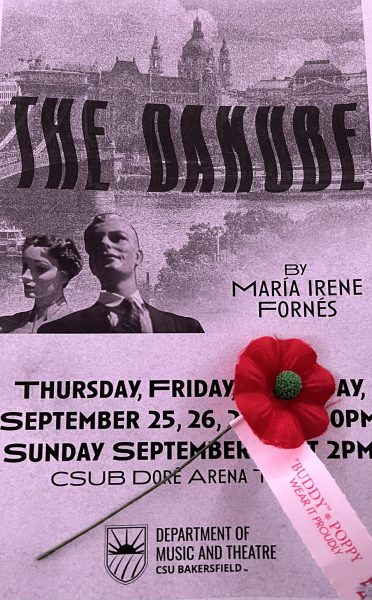CSUB faculty express concerns about disparity of raises
October 13, 2022

California State University, Bakersfield faculty are concerned about the disparity between president and faculty raises.
The 2022-2024 CSU faculty contract included a 4% general salary increase. However, Gov. Gavin Newsom and California legislators cut the allocation for the CSU budget by $100 million in their last revision. This reduction brought the general salary increase to 3%.
Dr. David Gove, department chair and professor of mathematics, said that faculty members were scheduled to receive the 3% raise in July 2022.
The raise that was supposed to take effect in July 2022 has only appeared in faculty paychecks starting in October, said Gove. He also said that this is a regular occurrence.
A general salary increase of 4% should have also taken effect in July 2021. According to Gove, the raise was effective several months later, on different days for different professors.
Gove said that the CSU did send out a back payment equal to the amount that faculty missed between July 2021 and the date that the raise took effect.
“Right now, we’re mostly just upset about what was promised to us,” said Gove. “What we thought was going to be the 4%, which, of course, is still low compared to what the presidents are getting.”
The CSU Board of Trustees also approved raises for CSU presidents and executives. This went into effect in July 2022.
According to the 2022 CSU Executive Compensation Summary, CSU Bakersfield President Lynnette Zelezny received an approximate $58,000 raise. This brings her salary to $390,892 from $332,109.
Along with the raise, Zelezny receives an annual housing allowance of $50,000.
Zelezny also received a 10% equity raise in response to her performance reviews.
Zelezny’s salary adjustment makes her salary comparable to other universities, wrote CSUB Public Information Officer Jennifer Self in an email.
Gove said that he is not upset with presidents for accepting the raise that was offered them, but that the decision emphasizes the misplaced priorities of the CSU Board of Trustees.
“We don’t understand why the Board of Trustees can give them large raises but give us raises that are less than the rate of inflation,” said Gove.
Jannette De La Cruz, a business administration major at CSUB, said that she thinks faculty members deserve higher raises, especially for their work throughout the COVID-19 pandemic.
“It seems unfair, the big boss is getting the big raise and all the little guys are not getting as much,” said De La Cruz.
During the President’s Open Forum on Sept. 26, Zelezny said that the faculty and president raises are deserved raises due to inflation, and that the Board of Trustees tried to be fair about this decision.
“We are making strong advocacy to the governor so that that will be covered,” said Zelezny, “but it is very important to hold on to our strong faculty and staff. They should be well compensated, and that includes administrators as well.”
Dr. Rhonda Dugan, an associate professor of sociology, said that it is important to note that some pay differences are related to the different ranks of faculty, such as full-time lecturers, part-time lecturers, tenured faculty, and tenured track faculty.
The idea of compensation has always been an important topic because faculty want to feel valued and paid, said Dugan.
Dugan explained that this issue is expanding beyond just money. It also includes time and workload.
According to Dugan, many faculty’s workloads increased during the COVID-19 pandemic to provide the best academic experience for students.
“Of course, we want salaries to survive, pay our bills, rent, mortgage. But I think in many ways, it comes to workload,” said Dugan. “It’s maybe not just the amount of work, but the type of work that is tied to why faculty want a more equitable distribution.”
Aside from teaching, Dugan said faculty have other responsibilities, such as doing research and service. Faculty often engage through committee work and serving the students, departments, and local community.
Dugan said that she sees advocacy at an organizational level, but that advocacy is sometimes tied to the individual faculty members who look for ways to boost their salaries.
“Faculty are aware of what they earn and compare it to, not someone who is in their department, but looking at someone who is comparable at another university,” said Dugan. “Sometimes that can be a way to advocate, by saying, ‘Here’s someone who does the work that I do, but they’re at another university. How can I get to where they are?’”
Gove is also the president of the Bakersfield chapter of the California Faculty Association.
CFA is the only authorized body to negotiate with the CSU regarding faculty contracts every three years.
According to Gove, demonstrators from CFA and Students for Quality Education attended a CSU Board of Trustees meeting on Sept. 15.
Gove was a speaker at a virtual session.
“At that point, every speaker was allowed one minute. So, in one minute, I just said that it was a shame that they couldn’t prioritize faculty as much as they were prioritizing the presidents,” said Gove.
According to Gove, CFA plans to hold more information campaigns to bring awareness to the issue.





